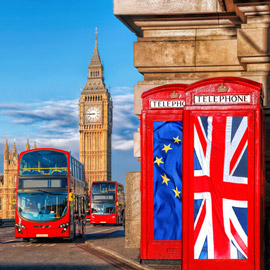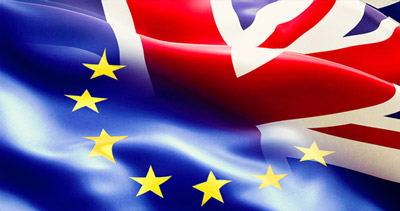What would Brexit mean for urban transport?
- Like
- Digg
- Del
- Tumblr
- VKontakte
- Buffer
- Love This
- Odnoklassniki
- Meneame
- Blogger
- Amazon
- Yahoo Mail
- Gmail
- AOL
- Newsvine
- HackerNews
- Evernote
- MySpace
- Mail.ru
- Viadeo
- Line
- Comments
- Yummly
- SMS
- Viber
- Telegram
- Subscribe
- Skype
- Facebook Messenger
- Kakao
- LiveJournal
- Yammer
- Edgar
- Fintel
- Mix
- Instapaper
- Copy Link
Posted: 16 June 2016 | Ian Hall | 6 comments
The 23 June is an important date in the sector’s calendar for multiple reasons, writes Ian Hall.


The 23 June is an important date in the sector’s calendar for multiple reasons, writes Ian Hall.


23 June has been highlighted on the office-wallcharts and online calendars of Intelligent Transport readers for a few months now.
This pivotal date is not only the day of the European Bus Forum 2016 but is also – almost as significantly – when the UK holds its referendum on European Union (EU) membership.
Intelligent Transport’s event will see more than 250 delegates from across Europe convene again on Manchester. By coincidence, this city in the north-west of England will also be where the result of the ‘Brexit’ (British exit from the EU) vote is announced, most likely at breakfast-time on 24 June.
UK Prime Minister David Cameron is battling for ‘Remain’, while other high-profile Conservative politicians, such as Boris Johnson, are leading the charge for ‘Leave’. The EU itself, naturally, is keen to keep the UK – one of the 28-nation bloc’s largest and most influential states – in the club.
The UK referendum strikes at the heart of fundamental issues such as sovereignty, identity and economy. So, naturally, organisations in the transport sector have been considering what leaving the EU would mean.
Buses, coaches, light-rail and metros (Intelligent Transport’s focus) have hardly been centre-stage in the debate – unless you take into account the slogan-emblazoned campaign ‘battle-buses’, of course. But the UK’s 43-year membership of the EU clearly impacts transport in multiple ways, directly and indirectly, and therefore the industry would be impacted by a vote to leave.
Centre-stage for aviation, maritime and rail
As momentum towards the referendum brewed, the UK Government actually took stock of the EU’s impact on UK transport via its grandly titled ‘Review of the Balance of Competencies between the UK and the EU’. This sprawling examination ran between 2012 and 2014, generating 32 reports, with one devoted to transport.
Aviation, maritime and rail emerge as the three transport modes that predominate in Whitehall’s analysis of Brexit’s potential impact (inevitably for the first two modes, given that air journeys and sea/port interests are mostly international). This modal focus is mirrored in transport-sector Brexit assessments done by private-sector consultancies, for example, economics consultancy Oxera, which this May produced a briefing note – ‘Brexit: implications for the transport sector’ – breaking out its assessment into Aviation, Ports and Rail chunks.
The Department for Transport (DfT) received 111 pieces of evidence for the Balance of Competencies review, and held six workshops (with three modal topics being maritime, aviation and rail – roads was the fourth, along with a session in Brussels and an ‘FCO [Foreign & Commonwealth Office] stakeholder event’).
‘Spurting out legislation’
The 70-page Balance of Competencies report for transport contains numerous sections of insightful and very relevant observations, albeit noticeably little explicitly relating to buses, coaches, metros and light-rail.
Those critical of the EU would grin (or indeed grimace) in likely recognition of some of the broader commentary about EU policymaking. For example, the report says: ‘One of the issues most remarked upon by [transport] stakeholders was the constant flow of legislation emanating from the [European] Commission. At the London workshop on maritime issues an attendee described the Commission as ‘spurting out legislation like a volcano’, and at the London rail workshop attendees expressed their frustration at the Commission’s ‘bureaucratic fidgeting’ and wanted regulatory stability.’
One section hitting Intelligent Transport’s sweet-spot reports: ‘As well as concerns about the quantity of [EU] legislation there were also concerns about the quality of legislation. The Confederation of Passenger Transport (CPT), representing the bus and coach industries, said: ‘Brussels’ generates some classic examples of the ‘wouldn’t it be a good idea if…’ school of policy-making which has largely been superseded in the UK by an evidence-based approach.’
‘Investment would fall’
Most of the transport organisations or individuals approached by Intelligent Transport for their views on Brexit’s potential impact declined to comment, largely citing a requirement or desire to stay ‘neutral’.
Among those willing to comment was Mark Watts, a Labour MEP for a decade until 2004 who now runs public affairs consultancy Luther Pendragon Brussels. He is also co-ordinator of UK Transport in Europe (UKTiE), a body that represents UK transport interests in Brussels.
Speaking in a personal capacity, he identifies “three main implications of a Brexit for the UK transport industry: all three are harmful and all three could have impact sooner than some people think.”
He says: “First, I think investment in the transport sector would fall. Uncertainty is the enemy of investment and most economists think the economy will shrink after Brexit, possibly for several years.”
“Second, I think fares could rise as there’s a strong possibility of a run on the pound – and, given the ongoing uncertainty, this has already happened in recent weeks, to an extent – causing rising energy costs. Someone will have to pay for a low pound: the UK government, taxpayers or fare-paying passengers. Given the pressure on public finances rising fuel costs can only be mitigated by increasing fares.
“Third, a Brexit would hit the whole transport supply-chain in the UK, including manufacturing. Rules for European transport equipment will continue to be set in Europe, and the UK won’t have any say, like Norway, which is outside the EU but their transport sector seeks to comply with EU standards. If you’re [as a country] not at the top-table it will surely be harder for your country’s firms to be shortlisted for contacts overseas, let alone win tenders. It’s not just about regulatory compliance: it would be about retaliation.”
EU regulations’ impact
Dr Matthew Niblett, Director of research organisation the Independent Transport Commission (ITC), was another willing to give his view. He told us: “Areas on which EU regulations have had an impact on urban transport in the UK include competition, passenger rights and safety. EU rules safeguarding the rights of bus and coach passengers were implemented in 2013 and have recently been incorporated into EEA [European Economic Area] agreements – so, the UK has to ensure it is compliant with EU regulations on things like disabled rights.
“Areas on which EU regulations have had an impact on urban transport include competition, passenger rights and safety” – Dr Matthew Niblett, Independent Transport Commission (ITC)
“The key question is what happens to these regulations in the event of a Leave vote. It is a strong possibility that the UK will then seek membership of the EEA in order to benefit from access to the Single Market, in which case many regulations will still be applicable, although we will have little say over the creation of new rules.”
Asked whether he believes UK bus and coach operators would welcome potentially offloading EU-instigated rules in such areas, Dr Niblett says: “I would imagine reputable operators are keenly interested in issues such as customer service and safety so they would still want to uphold standards.”
Another senior transport professional who spoke to Intelligent Transport concurred with this, believing that EU-wide rules or standards ranging from environment-related requirements to engines were unlikely to be ignored in the UK after a Brexit.
“Leaving the EU would affect transport manufacturing and purchases in several ways” – Tony Travers, Director, LSE London
Tony Travers, Director of LSE London (a research centre at the London School of Economics), has a trade-focused spin on how Brexit would affect transport. He tells Intelligent Transport: “Leaving the EU would affect transport manufacturing and purchases in several ways. Trade rules would be likely to change, with different tariff rules. UK manufacturers would still have to adhere to EU rules if they wished to sell exported goods there. Presumably the UK would continue to have procurement rules, though these might change. British operators wishing to offer services within the EU and EU countries’ operators offering services in Britain would have to fit in within new trade rules. ‘State aid’ rules could be altered outside the EU if the government wished to do so.”
Employment and free movement
In contrast to most corporates and public-sector bodies, trade unions have been more willing to express their positions on Brexit.
The TUC wants the UK to stay in the EU, as does Unite, which is ‘campaigning for the UK to stay in the EU as the best hope for workers’. Within the transport arena, the RMT and train-drivers’ union Aslef are both backing Brexit.
In respect of workers’ rights, the ITC’s Niblett says: “We know that a high proportion of employees’ rights are safeguarded through EU legislation. So you can understand why trade unions are so nervous about leaving.”
Free movement of people across the EU has inevitably been one the main talking points in the Brexit dialogue, and can be examined ‘both ways’: the number of EU nationals living and working (including many in transport) in the UK; and the number of UK nationals on the Continent.
One senior transport professional spoken to by Intelligent Transport had an interesting perspective on the latter aspect, saying that Brexit was likely to cause many retired ex-pats to return home from sunnier shores – and these retirees would take up concessionary/free local urban transport.
But perhaps the most pressing concern for employers is where – literally, in some cases – Brexit would leave their non-British European employees: a question that spins into countless further uncertainties. Specific employment-related issues in the transport sector include driver CPC (‘Certificates of Professional Competence’), which gained a mention in the Balance of Competencies review.
Just days to go
The ITC’s Dr Niblett had various further thoughts on Brexit: He told us: “If the UK votes Leave there would clearly be a lengthy period of economic and political uncertainty. In the case of an economic downturn it is reasonable to assume that if unemployment rises and incomes are squeezed, passenger numbers would fall. This might mean lower fare revenues, but at the same time slightly less wear-and-tear on transport infrastructure and perhaps lower maintenance costs. We might also see the return of net emigration – in contract to current rates of immigration – causing a downturn in passenger numbers. In respect of indirect consequences, there is also talk of the potential break-up of the UK, which would bring other profound challenges.”
Beyond the macroeconomics and other uncertainties, the impact on transport depends largely on what deal the British government negotiates (and to what extent it will try to sign up to existing regulations). But even the procedures and timetable for a UK divorce from the EU are disputed.
So, is Brexit on the cards? At the time of writing, with just days to go until the vote, the polls are close, and many voters remain undecided. Voter turnout is being seen as crucial in determining the outcome.
Even if Brexit is not centre-stage at the European Bus Forum on 23 June, the event’s timing means the EU Referendum will be the hot topic on everyone’s lips.
Do you agree with what they say?
Comment below and let us know.
Related topics
Business Models, Fleet Management & Maintenance, Multimodality, Ticketing & Payments, Transport Governance & Policy
Related people
Ian Hall









Dear all
Yes ,Brexit – living out but to be present in E.U. space. like superior country ex member of E.U. WITH GREAT SENCE OF SOFT FEELINGS TO “EX WIFE E.U”and more Energy and Motivations for each citizen in UK.!!!!
I am for Solution and better future for UK and others in E.U to keep going forward not to argue each others and talking instead working for himself and Community!!!.
Why!
1/Historical- UK is taking his way to World, dated many centuries and confirmed that is not alone but do not feel presence of other as well!
2/Progress – it is not easy things to take, because it takes time and efforts,as we can see UK taking different that others in E.U. means better and faster than others!
3/Standard – it is not “photo on the Wall” , it is centuries of hard working, happening this days without results by each side in E.U. members.
4/Future – to achieve main goals not means to taking money by others as good “sports journey “, not means to screaming for Funds money, not mean to give yourself with yours unperfects things, as and like member to EU. by others members to UK.
sO, I hope that it should be better in sense of moving forward like locomotive of development by UK. clean situation when solidarity is good manner not only obligation for each member and to be in Future means to be for sure in REALITY OF THIS WORLD, which foundation posted so strong in las 300 years of progress and developing in the World! Long Live Great Britain!
Thanks for opportunity and my best wishes to people of UK!!
Mr Zlatko Preskakulev Serbia
I think LEAVE will means problems for all sectors , not transport only .
LEAVE means really the end of EU.
From the other side REMAIN must be used as a dramatic chance to change to semplify the actual “bureaucratic ” and “Idiotic” EU rules …and not in transport only.
World trend is going toward integration. That’s a matter of fact. The spirit of the begginers of EU was to avoid wars like first and 2d world W. And that’s good in their roots. Alike all people source has the same roots and all of us are what its called “the humanity”. At the same time is also true that different kind of birds exists. And every one has his own characteristics; and everyone flaps by own wings.
For me the key point is WHO will manage EU. Options are:
1.- Germans 90%?: very bad.
2.- Germans 20% + French 20% + British 20% + Italians 15% + Spanish 15% + Other 10%.
For me option 2.- is much better and represents the real European spirit.
British culture should be the real counterpoint that I cannot imagine without.
I am English and I have lived in Italy for 35 years. I import and collaborate with many U.K. companies which I believe will have a devastating effect on this business if the Brexit camp wins. I believe that Leave group have exaggerated out of all reasonable context the situation on the immigration problem scaremongering people in the U.K. that they will be inundated with immigrants from Turkey and the Eastern block countries. It is about time that the British started negotiating this problem and start behaving like a country that has always been outside the European Union. I always thought that us English were the Champions in the world for negotiating on DIFFICULT problems instead of backing off each time. Let’s stay in for Gods sake and start behaving like a responsible population instead of a remote Island people.
Key EU Transport Legislation does not dictate Urban Transport not does it dictate commercial contracts.
The UK joined the EU in 1973, the EU have adopted many best practices from countries throughout its membership and further afield.
One could say the EU Parliament was out of balance allowing Germany to have 99 members whilst the UK has 73.
It would appear many of us are suggesting if the UK vote to leave, then it will result in the demise of the EU itself.
There much wrong in the EU and many good things, if the leaving the EU triggers its demise, how could that be.
I work regularly in EU part funded projects and know from experience the EU is blind to the abuse it has allowed in its research programmes, whilst I read as we all do the EU annual budget (P&L) financial management has yet to be signed off (approved).
Could the UK by voting to leave the EU trigger the changes, as much more is at stake commercially – as for whether Urban Transport will change, why should it, it is the international supply chain companies that in the UK includes DHL will not change as to do so would destroy their business. We are a Global Nation closely linked to Europe, Great Britain has led the world in a Commonwealth where infrastructures are fluid, they were before we joined the EU as out institutions and laws have shown. Whilst I will say the NHS is evolving and changing its design has been emulated the world over since 1946.
It will remain contentious an issue; as I mentioned above I am constantly actively seeking to develop technology and its exploitation, doing so is not merely with EU citizens and companies, it is where the knowhow can be found – for example I started working with the Peoples Republic of China Science and Technology (MOST) Division in 1992, I am still working with them in 2016.
I agree that UK is going in the wrong direction as it will for sure promote protectionism and that will not help UK.
With a non membership you can not expect to be treated in the same way, otherwise a membership doesn’t mean anything.